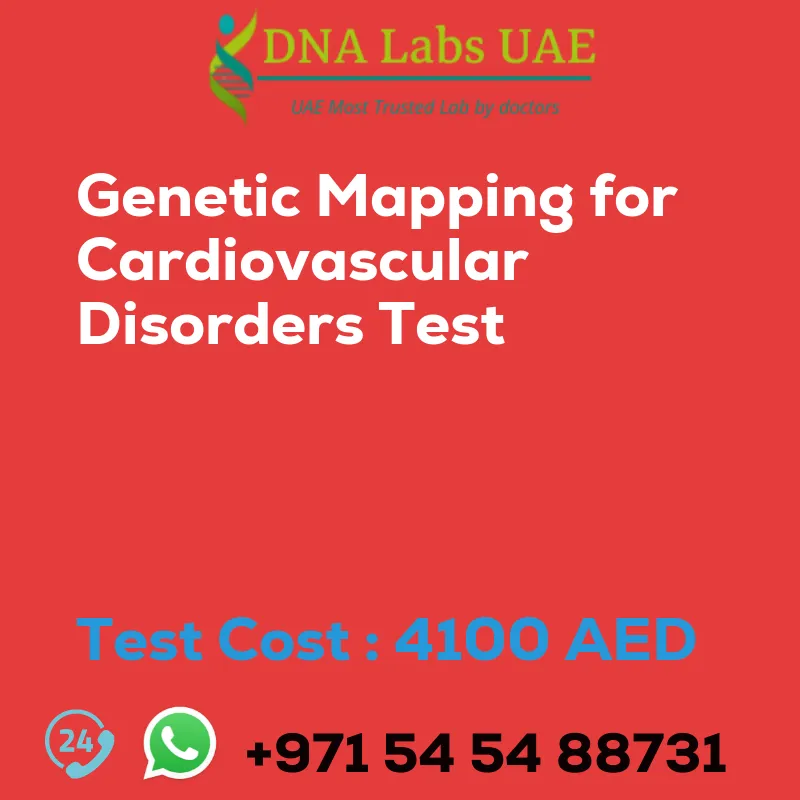Genetic Mapping for Cardiovascular Disorders
Test Cost: AED 4100.0
Symptoms, Diagnosis, and Test Details
The Genetic Mapping for Cardiovascular Disorders test offered by DNA Labs UAE is a comprehensive analysis of specific genes and genetic variations associated with an increased risk of developing cardiovascular diseases. By understanding the genetic basis of these disorders, targeted treatments and preventive measures can be developed.
Test Components and Sample Condition
- Test Name: Genetic Mapping for Cardiovascular Disorders
- Test Components: SNP Genotyping using Microarray
- Price: AED 4100.0
- Sample Condition: Submit 3 mL (2 mL min.) whole blood in 1 Lavender top (EDTA) tube. Ship refrigerated. DO NOT FREEZE.
- Report Delivery: Sample daily by 9 am; Report 8 weeks
- Doctor: Cardiologist
- Test Department: Molecular Diagnostics
- Pre Test Information: Duly filled Genome Mapping Consent Form (Form 26) is mandatory.
The Process of Genetic Mapping for Cardiovascular Disorders
Genetic mapping for cardiovascular disorders involves several steps to identify and analyze specific genes and genetic variations associated with an increased risk of developing these diseases:
- Study Design: Researchers design a study to investigate the genetic factors involved in cardiovascular disorders. This may include recruiting participants with and without the disorder, collecting their genetic samples, and obtaining relevant clinical information.
- Genotyping: The collected genetic samples are analyzed using various techniques to identify genetic variations, such as single nucleotide polymorphisms (SNPs), that may be associated with cardiovascular disorders. High-throughput genotyping platforms are often used to analyze a large number of genetic markers simultaneously.
- Association Analysis: Statistical methods are used to determine if there is a significant association between specific genetic variations and the presence or risk of cardiovascular disorders. This analysis may involve comparing the frequency of certain genetic markers between affected and unaffected individuals.
- Replication: The initial findings are replicated in independent populations to ensure the robustness of the associations. This helps to validate the identified genetic variations as true risk factors for cardiovascular disorders.
- Functional Analysis: Once potential genetic risk factors are identified, researchers investigate their functional significance. This may involve studying the biological mechanisms by which these genetic variations influence cardiovascular health, such as their effects on gene expression or protein function.
- Genetic Risk Score Development: Based on the identified genetic variations, researchers may develop a genetic risk score that combines multiple genetic markers to predict an individual’s risk of developing cardiovascular disorders. This score can be used for risk stratification and personalized preventive strategies.
- Clinical Applications: The knowledge gained from genetic mapping studies can inform clinical practice by identifying individuals at high risk of developing cardiovascular disorders. This can guide targeted screening, prevention, and treatment strategies. It may also contribute to the development of new drugs or therapies that specifically target the identified genetic pathways.
It is important to note that genetic mapping is a complex process that requires collaboration between researchers, clinicians, and geneticists. It also requires large sample sizes and rigorous statistical analysis to ensure reliable results. Additionally, genetic mapping is just one piece of the puzzle in understanding cardiovascular disorders, as environmental and lifestyle factors also play significant roles.
| Test Name | GENETIC MAPPING FOR CARDIOVASCULAR DISORDERS Test |
|---|---|
| Components | |
| Price | 4100.0 AED |
| Sample Condition | Submit 3 mL (2 mL min.) whole blood in 1 Lavender top (EDTA) tube.Ship refrigerated. DO NOT FREEZE. Duly filled Genome Mapping Consent Form (Form 26) is mandatory. |
| Report Delivery | Sample Daily by 9 am; Report 8 weeks |
| Method | SNP Genotyping using Microarray |
| Test type | Heart Diseases |
| Doctor | Cardiologist |
| Test Department: | MOLECULAR DIAGNOSTICS |
| Pre Test Information | Duly filled Genome Mapping Consent Form (Form 26) is mandatory. |
| Test Details |
Genetic mapping for cardiovascular disorders involves the identification and analysis of specific genes and genetic variations that are associated with an increased risk of developing cardiovascular diseases. This process helps in understanding the genetic basis of these disorders and can potentially lead to the development of targeted treatments and preventive measures. Here is a general overview of the steps involved in genetic mapping for cardiovascular disorders: 1. Study Design: Researchers design a study to investigate the genetic factors involved in cardiovascular disorders. This may involve recruiting participants with and without the disorder, collecting their genetic samples, and obtaining relevant clinical information. 2. Genotyping: The collected genetic samples are analyzed using various techniques to identify genetic variations, such as single nucleotide polymorphisms (SNPs), that may be associated with cardiovascular disorders. High-throughput genotyping platforms are often used to analyze a large number of genetic markers simultaneously. 3. Association Analysis: Statistical methods are used to determine if there is a significant association between specific genetic variations and the presence or risk of cardiovascular disorders. This analysis may involve comparing the frequency of certain genetic markers between affected and unaffected individuals. 4. Replication: The initial findings are replicated in independent populations to ensure the robustness of the associations. This helps to validate the identified genetic variations as true risk factors for cardiovascular disorders. 5. Functional Analysis: Once potential genetic risk factors are identified, researchers investigate their functional significance. This may involve studying the biological mechanisms by which these genetic variations influence cardiovascular health, such as their effects on gene expression or protein function. 6. Genetic Risk Score Development: Based on the identified genetic variations, researchers may develop a genetic risk score that combines multiple genetic markers to predict an individual’s risk of developing cardiovascular disorders. This score can be used for risk stratification and personalized preventive strategies. 7. Clinical Applications: The knowledge gained from genetic mapping studies can inform clinical practice by identifying individuals at high risk of developing cardiovascular disorders. This can guide targeted screening, prevention, and treatment strategies. It may also contribute to the development of new drugs or therapies that specifically target the identified genetic pathways. It is important to note that genetic mapping is a complex process and requires collaboration between researchers, clinicians, and geneticists. It also requires large sample sizes and rigorous statistical analysis to ensure reliable results. Additionally, genetic mapping is just one piece of the puzzle in understanding cardiovascular disorders, and environmental and lifestyle factors also play significant roles. |








